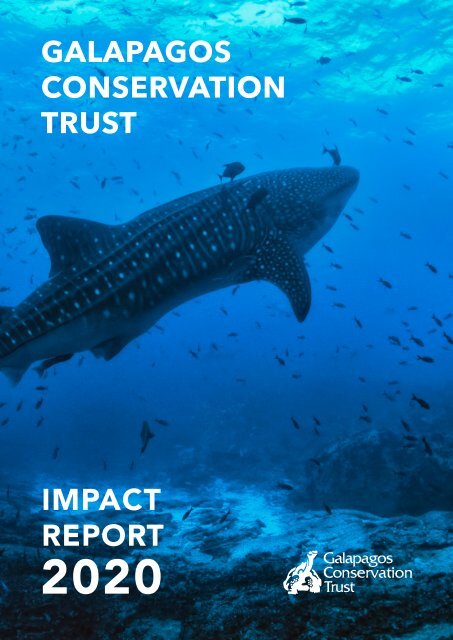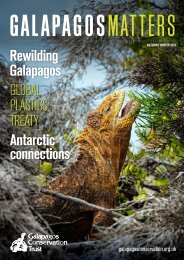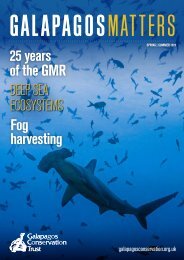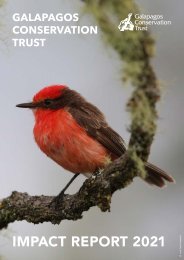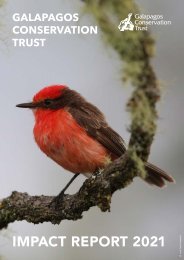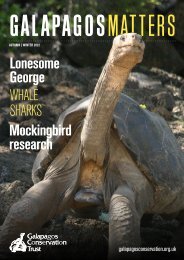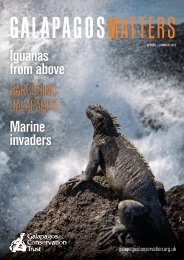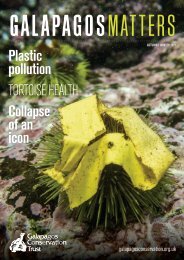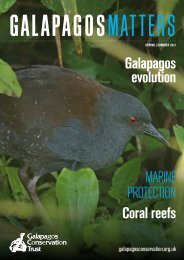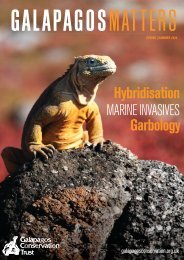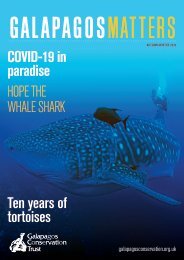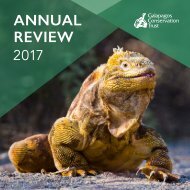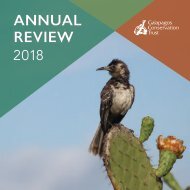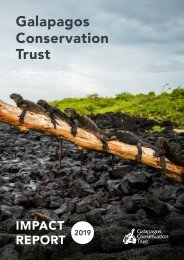2020 Impact report 2020 - Galapagos Conservation Trust
You also want an ePaper? Increase the reach of your titles
YUMPU automatically turns print PDFs into web optimized ePapers that Google loves.
GALAPAGOS<br />
CONSERVATION<br />
TRUST<br />
IMPACT<br />
REPORT<br />
<strong>2020</strong>
OVERVIEW FROM<br />
CHIEF EXECUTIVE<br />
The COVID-19 pandemic in <strong>2020</strong><br />
undoubtedly had a significant impact on<br />
<strong>Galapagos</strong> <strong>Conservation</strong> <strong>Trust</strong> (GCT), our<br />
activities and the Islands. But, despite<br />
this, we ended the year as we began, with<br />
a new wave of optimism and energy; the<br />
GCT team implementing our new threeyear<br />
strategic plan, a big win for our<br />
plastics programme and continued efforts<br />
to eliminate COVID-19 in <strong>Galapagos</strong>.<br />
Focussing on key threats to the Archipelago; invasive<br />
species, the human footprint and climate change, our<br />
programme activities assembled to restore <strong>Galapagos</strong>’<br />
unique habitats, protect its wondrous species, and<br />
work with local people to provide sustainable solutions<br />
to combat the effects of modern living on the Islands.<br />
Importantly, we also provided relief for local people<br />
impacted by the pandemic.<br />
GCT’s Board agreed on an exceptional donation to provide<br />
essential PPE to Galapaguenians, whilst the GCT team<br />
speedily adapted our educational materials for home<br />
learning and provided support to families to grow their<br />
own food in the face of limited options. Looking to longerterm<br />
solutions, we are now supporting those affected by<br />
the reduction in tourism income, which in turn will protect<br />
the unique wildlife of these Enchanted Isles – from a<br />
‘cash for work’ scheme to collect plastic from beaches, to<br />
providing training in the latest DNA sequencing techniques<br />
to create a genetic library of <strong>Galapagos</strong> species.<br />
The greatest threat from people in <strong>2020</strong> came from<br />
beyond the Islands’ borders, with the arrival of a huge<br />
international industrial fishing fleet on the outskirts of<br />
the Ecuadorian Exclusive Economic Zone. Initial research<br />
carried out through our plastic programme indicates that<br />
around 30% of the plastic waste is coming from sources<br />
at sea, likely these industrial fishing vessels. Sadly, marine<br />
species are being caught up both in the waste from these<br />
fleets, and in their nets once they leave the safety of the<br />
<strong>Galapagos</strong> Marine Reserve (GMR). We fear one such whale<br />
shark, ‘Hope’, which we were tracking, was caught.<br />
Although ‘Hope’ was lost, the team tagged ten more<br />
individuals, and ‘Coco’ became the first tagged whale<br />
shark to follow the ‘Swimway’ between the GMR and<br />
Cocos island in Costa Rica.<br />
We were thrilled to end such a difficult year with the<br />
news that we had won a four-year UK government grant<br />
to forge forward with our work to rid the Islands of<br />
plastic waste. However, we were equally disappointed<br />
that this funding was hit by the overseas aid cuts in early<br />
2021. We are continuing to lobby the UK government for<br />
reinstatement of these funds in 2022.<br />
Our ability to weather these unforeseen challenges<br />
comes from our ingenious partners, staff team and Board<br />
of <strong>Trust</strong>ees but, most importantly, to our supporters who<br />
stepped up with gifts-in-kind, volunteering and financial<br />
donations, ensuring our income remained strong at<br />
£714,647 in <strong>2020</strong>. We really could not have survived<br />
<strong>2020</strong> without you, and neither could the Islands and<br />
the incredible species and people who live there. With<br />
your support behind us, our optimism for the future is<br />
resolute. Thank you once again.<br />
Sharon Johnson<br />
Chief Executive<br />
© Sharon Johnson<br />
1
WHO WE ARE<br />
© Gina Friedrich<br />
What We Do<br />
<strong>Galapagos</strong> <strong>Conservation</strong> <strong>Trust</strong> is the<br />
only UK registered charity to focus solely<br />
on the conservation of the <strong>Galapagos</strong><br />
Islands, one of the most unique and<br />
ecologically important, but vulnerable,<br />
areas in the world.<br />
With over 25 years of experience supporting impactful<br />
conservation programmes in <strong>Galapagos</strong>, we partner<br />
with Ecuadorian authorities, NGOs, local communities<br />
and leading scientists.<br />
By raising funds and awareness in the UK, we are able<br />
to support and deliver projects in <strong>Galapagos</strong> and<br />
respond to key threats facing the Islands, focusing<br />
on restoring natural habitats, protecting threatened<br />
species and driving sustainable solutions.<br />
Our Vision<br />
The unique nature and beauty of the<br />
<strong>Galapagos</strong> Archipelago conserved,<br />
sustained and protected in perpetuity.<br />
Our Mission<br />
We support, develop and promote projects that<br />
achieve measurable conservation, sustainable living,<br />
and protection of the environment of <strong>Galapagos</strong>.<br />
© <strong>Galapagos</strong> <strong>Conservation</strong> <strong>Trust</strong><br />
Our Team<br />
Sharon Johnson, Chief Executive<br />
Alice Marks, <strong>Trust</strong>s Fundraising Officer<br />
Andy Donnelly, Lead Flagship Programmes Manager<br />
Anna Berends, Individual Giving Officer<br />
Anne Guézou, <strong>Galapagos</strong> Outreach Coordinator<br />
Beth Byrne, Communications & Marketing Officer<br />
Claire McKinley, Head of Finance<br />
Clare Simm, Communications Manager<br />
Dr Jen Jones, Head of Programmes<br />
Jodie Assinder, Operations Officer<br />
Kelly Hague, Senior Philanthropy Manager<br />
Lisa Wheeler, Projects Manager<br />
Lucía Norris, Project Consultant<br />
Mike Crossley, Head of Fundraising & Communications<br />
Sarah Langford, Education Writer<br />
Sol Espinosa, Project Consultant<br />
2
OVERVIEW<br />
FROM CHAIR<br />
Thanks to you, our loyal donors,<br />
who supported us throughout <strong>2020</strong>,<br />
we maintained a good income level<br />
throughout the year despite the<br />
unforeseen setbacks we encountered –<br />
enabling us to end the year in a better<br />
position than anticipated when the<br />
pandemic first struck. Undeterred by the<br />
close-down of the Islands, we worked<br />
closely with our partners on the ground<br />
to replan our programmes, enabling us<br />
to continue to deliver outstanding<br />
science, conservation and education<br />
initiatives whilst expanding our efforts<br />
to respond to the COVID-19 crisis.<br />
The groundwork for the important<br />
eradication phase of our flagship Floreana<br />
programme forged ahead. Critical research<br />
for reintroductions continued in <strong>2020</strong> for<br />
several wonderful bird species, including<br />
the vibrant little vermilion flycatcher.<br />
The culmination of years of hard work<br />
by GCT and all our partners is now very<br />
much in sight!<br />
GCT was also able to advance activities<br />
focussing on the increasing threats of<br />
industrial fishing and negative impacts<br />
of climate change, which form a core<br />
element of our political advocacy work.<br />
By working with the newly elected<br />
Ecuadorian President and his incoming<br />
administration in 2021, we have high<br />
hopes for the increased protection of the<br />
Islands and the surrounding <strong>Galapagos</strong><br />
Marine Reserve as we continue to gather<br />
critical scientific evidence and prepare for<br />
Galapaguenian voices to be heard at<br />
the UN Climate Change Conference<br />
(COP26) later this year. This will be<br />
a key moment for <strong>Galapagos</strong> and<br />
the world, where nations will come<br />
together to strengthen ambitions to<br />
protect the most vulnerable to the<br />
effects of climate change.<br />
Like the rest of the world, we are<br />
unsure what further COVID-related<br />
impacts lie ahead but today, as<br />
I write this, I am buoyed by the<br />
news that the Islands are now<br />
free from COVID-19 and by the<br />
generosity of our supporters who<br />
did not forget us, or <strong>Galapagos</strong><br />
during this most turbulent of times.<br />
With our professional staff team,<br />
an innovative network of partners<br />
and a dedicated Board of <strong>Trust</strong>ees,<br />
although we remain cautious in our<br />
plans, we are also very optimistic for<br />
2021 and the future. Thank you once<br />
again for all your support.<br />
© Charmian Caines<br />
Charmian Caines<br />
Chair<br />
Our <strong>Trust</strong>ees<br />
Charmian Caines<br />
(Chair)<br />
Chris Jarrett<br />
Jane Tozer OBE<br />
Jonathan Lea<br />
(Honorary Treasurer)<br />
Dr Marta Tufet<br />
Michael Drake<br />
(Vice Chair)<br />
Pippa Carte<br />
Dr Becky Nesbit<br />
Sandra Charity<br />
Our Ambassadors<br />
Monty Halls (President)<br />
Angela Darwin<br />
Dr Antje Steinfurth<br />
Dorothy Latsis<br />
Godfrey Merlen<br />
Dr Henry Nicholls<br />
Sir James Barlow Bt<br />
Jennifer Stone<br />
Julian Fitter<br />
Liz Bonnin<br />
Randal Keynes<br />
Dr Sarah Darwin<br />
Stanley Johnson<br />
We often speak of critical times, key<br />
events, and seminal phases in the<br />
world of conservation, but we should<br />
all be entirely clear about what this<br />
moment represents in terms of the<br />
future of the <strong>Galapagos</strong> Islands. The<br />
global pandemic has disrupted the<br />
infrastructure of tourism and the<br />
conservation funding it creates to such<br />
a degree that we have entered a truly<br />
seminal period. Our efforts today,<br />
therefore, require greater focus, more<br />
application, and more energy than<br />
ever before if the delicate ecosystems<br />
of this irreplaceable Archipelago are to<br />
be maintained. My lingering memories<br />
of the Islands are of the outstanding<br />
individuals and committed groups that<br />
are making a genuine difference - it<br />
is incumbent on us that we support<br />
them in every way we can. Through the<br />
continued enthusiasm and commitment<br />
of GCT and its supporters, we are<br />
achieving that aim. It is something that<br />
will reap genuine conservation rewards<br />
in the months and years ahead.<br />
© Monty Halls<br />
Monty Halls<br />
President<br />
3
© Fernando Faciole<br />
OUR SUPPORTERS<br />
We would like to extend our most sincere<br />
thanks to everyone who helped us during<br />
a very challenging year, through gifts-in-kind,<br />
volunteering and financial donations. This<br />
overwhelming support meant all our projects<br />
continued to be funded. A special mention of<br />
thanks goes to those listed.<br />
Supporters in <strong>2020</strong><br />
The Allan & Nesta Ferguson Charitable <strong>Trust</strong>,<br />
Aurum Charitable <strong>Trust</strong>, British Embassy Quito,<br />
Ken Collins & Jenny Mallinson, Edith Murphy<br />
Foundation, Ernest Kleinwort Charitable <strong>Trust</strong>,<br />
Evolution Education <strong>Trust</strong>, J Paul Getty Jr General<br />
Charitable <strong>Trust</strong>, Philip Darwin, Prince Albert II<br />
of Monaco Foundation, The Sackler <strong>Trust</strong>, Swiss<br />
Association of Friends of the <strong>Galapagos</strong> Islands,<br />
The Woodspring <strong>Trust</strong><br />
AQUA-FIRMA Worldwide, Bryan Guinness Charitable<br />
<strong>Trust</strong>, Liz Callegari, Alan Chapman, Susan Cole,<br />
Craghoppers Ltd, Paul & Jill Davis, Dennis Curry’s<br />
Charitable <strong>Trust</strong>, The Dolan Charitable <strong>Trust</strong>,<br />
Ennismore Foundation, Alexis Frier, GESS Charitable<br />
<strong>Trust</strong>, G F Eyre Charitable <strong>Trust</strong>, Nicholas & Judith<br />
Goodison, Amy Hammond, Janice & Alan Harris,<br />
Rainer Hiemer, International <strong>Galapagos</strong> Tour<br />
Operators Association, Carol Kemm, Langdale <strong>Trust</strong>,<br />
Hazel Ledgard, Mark & Sophie Lewisohn, Dorothy<br />
Lunt, Jerome Mulliez, Jacqueline Murray, Ocean<br />
<strong>Conservation</strong> <strong>Trust</strong>, Riva Handelsgesellschaft mbH,<br />
R G Hills Charitable <strong>Trust</strong>, The Dr Robert Andrew<br />
Rutherford <strong>Trust</strong>, ShareGift, Judith Shave, Chris<br />
Spooner, Steppes Travel, Temperatio Foundation,<br />
Jane E Tozer, Voice For Nature Foundation, Andrew<br />
Warren, William Haddon Charitable <strong>Trust</strong>, Richard<br />
Wilkins, Kirsty Wilson<br />
<strong>Galapagos</strong> Guardians<br />
Csaba Barta, Edward & Sally Benthall, Meg Boak, Alan Chapman, Jeremy Coller,<br />
Tim & Catherine Cox, Annie Coxon, Paul & Jill Davis, Christine Edwards, Sandie<br />
Evans, Penelope Eve, Jennifer Frow, Patrick & Barbara Gallagher, Nicholas &<br />
Judith Goodison, Oliver Graham, Claire Halpin, Emma Healey, Sue Henning,<br />
Daniel Hochberg, Mavis Hughes, Elizabeth & Roderick Jack, Margaret Jackson,<br />
Diana & Robin Jakeways, Chris John, Carol Kemm, Darren Leftwich, Camilla Legh,<br />
Mark Loveday, William & Felicity Mather, Sue McNab, Carolyn Michie, Brian Mills,<br />
Renate Nahum, Jackie Naylor, Mikael Olufsen, Sarah O’Neill, Barry & Ann Phillips,<br />
Michael Prater, Julian Ranger, Richard Rankin, Sarah Reynolds, The Dr Robert<br />
Andrew Rutherford <strong>Trust</strong>, Michael & Barbara Saville, Katherine & David Soanes,<br />
Chris Spooner, Nicholas Spooner, Thomas Spooner, Jennifer Stone, Catherine<br />
Thomas, Andrew Thompson, Jane E Tozer, Edmund Truell, Susan Walker, Jim<br />
Wheeler, Richard Wilkins, Kirsty Wilson, David Wiltshire, John & Jill Woodley<br />
4
OUR YEAR IN NUMBERS<br />
£714,647 of income<br />
An average of 15,457 unique<br />
website users per month to<br />
galapagosconservation.org.uk<br />
2,625 members<br />
18 volunteers gave their time<br />
3,355 individual financial supporters<br />
<strong>Galapagos</strong> Guardian members<br />
grew to 65<br />
~300 new people adopted an<br />
endangered <strong>Galapagos</strong> species<br />
We grew the number of people<br />
who want to learn about <strong>Galapagos</strong><br />
and our vital conservation work<br />
across all social media channels:<br />
5,732 followers (+22%)<br />
Monthly eNewsletter list<br />
grew to 9,152 (+64%)<br />
Engaged with 25 companies<br />
enhancing our brand profile<br />
10,637 followers (+29%)<br />
7,207 followers (+59%)<br />
Awarded £708,967 in grants<br />
to eight projects across our<br />
three pillars<br />
Engaged with people from<br />
50 different countries at two<br />
digital events<br />
89p from every pound<br />
we spent went towards<br />
conservation in <strong>Galapagos</strong><br />
5
© Helen Brierley<br />
Directly engaged with over<br />
1,979 young people, families<br />
and teachers through field activities,<br />
workshops, in schools and online<br />
across <strong>Galapagos</strong> and the Eastern<br />
Tropical Pacific<br />
10 whale sharks satellite<br />
tagged<br />
20 juvenile hammerheads<br />
tagged<br />
Total number of visits to our<br />
Discovering <strong>Galapagos</strong> website<br />
grew by 27%<br />
21 tortoise hatchlings tagged<br />
512 participants cleaned<br />
10,950kg of waste across<br />
168km of coastal and underwater<br />
sites across five islands – over<br />
80% of this waste was plastic!<br />
40% increase in mangrove<br />
finch breeding pairs compared<br />
to 2019<br />
7 teachers and 150 families<br />
involved in the Urban Family<br />
Gardening Project<br />
6 little vermilion flycatcher<br />
chicks successfully fledged<br />
OUR APPEAL TOTALS IN <strong>2020</strong><br />
Endangered<br />
Species Appeal<br />
£25,135<br />
Emergency<br />
Pandemic Appeal<br />
£20,400<br />
Fund for<br />
Hope Appeal<br />
£7,122<br />
6
THEORY OF CHANGE<br />
Our Mission Our Values What we do<br />
How we’ll<br />
achieve change<br />
We support, develop<br />
and promote projects<br />
that achieve measurable<br />
conservation, sustainable<br />
living, and protection<br />
of the environment<br />
of <strong>Galapagos</strong><br />
Professional – we retain<br />
integrity, honesty and<br />
respect for each other and<br />
those we encounter<br />
Creative – we have a mix<br />
of different skills and are<br />
open to new ideas<br />
Performance-driven –<br />
we strive to meet<br />
our mission through<br />
clear planning with<br />
measurable results<br />
We support and deliver<br />
projects in <strong>Galapagos</strong><br />
and respond to key<br />
threats by focussing on<br />
restoring natural habitat,<br />
protecting threatened<br />
species and driving<br />
sustainable solutions<br />
Driving conservation,<br />
sustainability and outreach<br />
programmes<br />
Collaborating with a<br />
diverse partner network<br />
Identifying knowledge<br />
gaps and working with<br />
world-leading researchers<br />
to address them<br />
Developing conservation<br />
tools with global relevance<br />
Celebratory – we take<br />
pride in what we deliver<br />
Open and Inclusive – we<br />
are one team and value all<br />
our supporters, partners,<br />
staff and volunteers<br />
Supporting local livelihoods<br />
and strengthening capacity<br />
for conservation<br />
Providing opportunities<br />
and resources to enrich<br />
education<br />
Flexible – we are open to<br />
new, exciting opportunities<br />
and ways of doing things<br />
Raising awareness of<br />
conservation issues and<br />
empowering people to act<br />
Advocating for changes in<br />
policy to better protect<br />
<strong>Galapagos</strong><br />
7
Who makes<br />
this happen<br />
What has to<br />
happen for this<br />
to be achieved<br />
The change<br />
we’ll see<br />
Our Vision<br />
Supporters – fund and<br />
advocate for our work<br />
Project partners – design<br />
and deliver impactful<br />
interventions<br />
Researchers – provide<br />
scientific evidence for<br />
policy and management<br />
tools<br />
Educators – inspire<br />
the next generation<br />
of conservationists<br />
Local communities –<br />
generate and deliver<br />
locally relevant solutions<br />
Robust scientific<br />
evidence produced to<br />
inform conservation<br />
People empowered to<br />
make sustainable choices<br />
that benefit <strong>Galapagos</strong><br />
Policies introduced<br />
to protect the <strong>Galapagos</strong><br />
National Park, <strong>Galapagos</strong><br />
Marine Reserve and<br />
migratory species<br />
Threats to key species<br />
and habitats mitigated<br />
in the long-term<br />
Habitats restored<br />
to preserve <strong>Galapagos</strong><br />
ecosystems<br />
Iconic <strong>Galapagos</strong><br />
species protected from<br />
key threats and saved<br />
from extinction<br />
Sustainable solutions<br />
found and communities<br />
become champions<br />
for change<br />
The unique nature<br />
and beauty of the<br />
<strong>Galapagos</strong> Archipelago<br />
conserved, sustained<br />
and protected in<br />
perpetuity<br />
Tourists – promote<br />
responsible tourism<br />
Industry – innovate and<br />
implement sustainable<br />
products<br />
Policy makers – protect<br />
through legislation<br />
UK charities now increasingly use theories<br />
of change to help them focus their activities,<br />
take a fresh look at their goals, articulate<br />
their mission, and see if their current<br />
strategy is helping them get closer to<br />
achieving their visions. We see our Theory<br />
of Change as the foundation of charity<br />
strategy, evaluation and communication.<br />
We use our Theory of Change as a roadmap,<br />
setting out clear steps to achieve the<br />
change we are striving for and describing<br />
how our work aims to make an impact on<br />
the world. Funders increasingly ask to see<br />
them for evidence of impact. It helps to<br />
answer the ‘so what?’ question and is the<br />
first step to good impact measurement.<br />
© <strong>Galapagos</strong> <strong>Conservation</strong> <strong>Trust</strong> 2021 8
IMPACTS OF COVID-19 IN <strong>2020</strong><br />
14th<br />
<strong>Galapagos</strong><br />
went into<br />
lockdown<br />
17th<br />
GCT office closed<br />
and staff started<br />
working remotely<br />
MAR<br />
23rd<br />
First confirmed<br />
cases of COVID-19<br />
in <strong>Galapagos</strong><br />
All fieldwork stopped<br />
and international<br />
project partners<br />
returned home<br />
One-off donation made by GCT to<br />
provide essential PPE to safeguard local<br />
farmers and the fishing community to<br />
minimise the impact of the pandemic<br />
and to support the Islands<br />
APR<br />
All in-person education<br />
and outreach activities<br />
in <strong>Galapagos</strong> cancelled<br />
22nd<br />
GCT staff on furlough<br />
for three weeks<br />
MAY<br />
We produced ‘home<br />
schooling’ packs for parents<br />
or teachers to use at home<br />
or in virtual classrooms<br />
Some fieldwork<br />
was allowed<br />
to restart<br />
Launch of the<br />
Urban Family<br />
Gardening Project<br />
JUN<br />
International<br />
industrial fishing<br />
fleet <strong>report</strong>ed to be<br />
the largest ever seen<br />
with over 300 vessels<br />
© <strong>Galapagos</strong> National Park<br />
Schools in <strong>Galapagos</strong> didn’t reopen after<br />
the summer holidays. Lessons went virtual<br />
from June <strong>2020</strong> and this remained the<br />
case into 2021<br />
Tourism restarted –<br />
mainly Ecuadorian<br />
due to international<br />
travel restrictions<br />
Launched<br />
the Plastic<br />
Storytelling<br />
Project<br />
OCT & NOV<br />
Virtual teacher training<br />
sessions with three UK<br />
universities<br />
JUL<br />
AUG<br />
SEPT<br />
OCT<br />
IMPACTS IN GALAPAGOS<br />
• The sudden halt in tourism, which makes up 80%<br />
of the local <strong>Galapagos</strong> economy, caused a huge<br />
increase in financial hardship in the community.<br />
• There was a 73% decline in tourist numbers in<br />
<strong>2020</strong> - 72,519 compared to 271,238 in 2019.<br />
• The decline in tourism caused problems for<br />
international tour operators and boat owners,<br />
many of whom provide support to conservation<br />
projects in <strong>Galapagos</strong> in various ways.<br />
• By the end of <strong>2020</strong>, there had been six confirmed<br />
deaths, two probable deaths and almost 1,000<br />
confirmed cases of COVID-19 in total – the majority<br />
on Santa Cruz (almost 600), fewer than 150 cases<br />
on San Cristobal and over 270 cases on Isabela.<br />
There were no cases on Floreana.<br />
One of my main concerns is the unknown, and<br />
likely negative, consequences of interrupted <strong>2020</strong><br />
fieldwork that plays a key role in the survival or<br />
restoration of species or populations.<br />
– Anne Guézou, GCT’s <strong>Galapagos</strong><br />
Outreach Coordinator.<br />
© Juan Carlos Guzman<br />
We supported a<br />
‘cash for work’<br />
scheme launched by<br />
the United Nations<br />
Development<br />
Programme<br />
(UNDP) Ecuador<br />
NOV<br />
We supported the launch of the<br />
Barcode <strong>Galapagos</strong> project – the largest<br />
ever citizen science project on the<br />
Islands, which aims to create a genetic<br />
library of <strong>Galapagos</strong> species<br />
9<br />
DEC
RESTORING HABITATS<br />
RESTORING FLOREANA<br />
is an ambitious, long-term programme<br />
to restore the ecosystem on the island<br />
by removing invasive mammals and<br />
reintroducing locally extinct species.<br />
• This is to ensure the survival of the<br />
55 threatened species present, such<br />
as the Critically Endangered medium<br />
tree finch, as well as reintroducing<br />
13 locally extinct species.<br />
• The invasive Philornis downsi fly<br />
now has a common name: the<br />
avian vampire fly.<br />
© Luis Ortiz Catedral<br />
• Due to COVID-19 and delays<br />
to the timeline of securing important<br />
government funding, the eradication<br />
of rats and feral cats from Floreana<br />
has been rescheduled for 2023.<br />
• This delay, although unexpected,<br />
is allowing the team to explore and<br />
incorporate cost-efficient infrastructure<br />
and technologies, such as using drones<br />
for baiting instead of helicopters, as well<br />
as fundraise for the remaining costs.<br />
• Once back in the field at the end of <strong>2020</strong>, the<br />
team undertook post-release monitoring of<br />
the finches from the captive holding trials.<br />
• 7 species, including lava lizards and geckos,<br />
monitored to obtain eradication baseline data. This<br />
data will be an invaluable tool to assess the impact<br />
on native species during and after the eradication.<br />
© Island <strong>Conservation</strong><br />
Our Partners Delivering the Programme in <strong>2020</strong><br />
Durrell Wildlife <strong>Conservation</strong> <strong>Trust</strong>, <strong>Galapagos</strong> National Park<br />
Directorate, Island <strong>Conservation</strong>.<br />
• The team also extended both the highland<br />
and lowland aviary complexes which will<br />
allow more finches with more space to<br />
be kept during the eradication phase of<br />
the project - a necessary mitigation action<br />
for these vulnerable species.<br />
10
PROTECTING SPECIES<br />
THE ENDANGERED SHARKS OF<br />
GALAPAGOS PROGRAMME<br />
is intensifying its efforts to protect sharks within<br />
and outside of the <strong>Galapagos</strong> Marine Reserve<br />
(GMR), which has one of the highest concentrations<br />
of endangered sharks in the world.<br />
• In May, the <strong>Galapagos</strong>-Cocos Swimway was declared<br />
a Mission Blue Hope Spot.<br />
• 25 new whale sharks were identified through photo ID<br />
for the global photo-identification database, bringing<br />
the total identified in <strong>Galapagos</strong> to over 600 (+5%).<br />
• 10 new whale sharks satellite tagged in August <strong>2020</strong>.<br />
RECORD BREAKING YEAR<br />
FOR WHALE SHARKS!<br />
• GCT was also able to advance activities focussing<br />
on the increasing threats of industrial fishing and<br />
negative impacts of climate change, which form<br />
a core element of our political advocacy work.<br />
• The Endangered Sharks of <strong>Galapagos</strong><br />
scientists contributed to the Ecuadorian<br />
Government’s White Paper for the Ocean<br />
Protection Commission.<br />
• In February, the shark nursery team completed<br />
2 of the 3 planned net surveys at both Puerto<br />
Grande and La Seca, as well as one of the<br />
planned island-wide drone surveys in March –<br />
then activities were halted for the rest of the year.<br />
• 20 juvenile hammerheads were caught<br />
and tagged to better understand<br />
pupping timings, which has<br />
important implications for<br />
artisanal fishery management.<br />
‘Coco’ had the first recorded track of a<br />
whale shark travelling between the GMR<br />
and Cocos island, Costa Rica - highlighting<br />
the importance of the proposed Swimway.<br />
Tracks from Johanita, Nemo and juvenile male in Jan 2021<br />
‘Nemo’ was the first tagged whale shark<br />
to do a round trip to and from <strong>Galapagos</strong>.<br />
She left the GMR and returned to the<br />
Archipelago after 80 days and around<br />
1,600km back to the tagging site -<br />
reinforcing the importance of the GMR in<br />
the regional movements of whale sharks.<br />
© <strong>Galapagos</strong> Whale Shark Project<br />
‘Johanita’ headed along the most common<br />
route towards the <strong>Galapagos</strong> Rift Zone and<br />
spent a considerable time in the proposed<br />
<strong>Galapagos</strong>-Cocos Swimway.<br />
SPOT #20364 was the only juvenile and<br />
only male tagged this season. His tracks<br />
will show age and gender differences in<br />
behaviour from the adult females.<br />
‘Hope’ the whale shark was set to be the<br />
first whale shark ever to be tracked leaving<br />
and returning to <strong>Galapagos</strong> in April, then<br />
in May her tag stopped transmitting in an<br />
area of intense fishing.<br />
On a research trip to Darwin island in August we<br />
started what was to be a quick dive. But then<br />
literally thousands of hammerhead sharks started<br />
to swim overhead. It was like a river; we couldn't<br />
get through and almost ran out of air!<br />
© Alex Hearn<br />
Please help us. Without<br />
our work, I believe sights<br />
like this could soon become<br />
a distant memory.<br />
– Dr Alex Hearn, GCT<br />
Science Partner and<br />
founder of MigraMar<br />
11<br />
4 images: © <strong>Galapagos</strong> Whale Shark Project
© Giant Tortoise Movement Ecology Programme<br />
THE GIANT TORTOISE<br />
MOVEMENT ECOLOGY<br />
PROGRAMME<br />
is studying these iconic species’ ancient<br />
migration routes and early years’ movements<br />
to inform conservation strategies.<br />
• 21 hatchlings tagged with radio transmitters.<br />
• Baseline health samples have now been<br />
collected from 600 individual tortoises.<br />
• A visit to Alcedo volcano, Isabela went ahead<br />
in December <strong>2020</strong> - 8 out of 11 tagged<br />
tortoises on the volcano were found, including<br />
Spikey, a female tortoise that had not been<br />
seen since 2016.<br />
Over the last three months, no<br />
field conservation activities were<br />
conducted in <strong>Galapagos</strong>. We could<br />
not conduct any education/outreach<br />
activities either. However, this<br />
break allowed us to regroup and<br />
reconsider some of our priorities<br />
and methodologies. I had time to<br />
focus on data and analyses. It was<br />
a very valuable time to re-evaluate<br />
our work and improve some methods<br />
for future activities.<br />
– Dr Ainoa Nieto, Wildlife Veterinarian<br />
and Researcher at the Charles Darwin<br />
Foundation, and researcher for the<br />
Giant Tortoise Movement Ecology<br />
Programme. July <strong>2020</strong><br />
© Joshua Vela Foncesca<br />
• 100 children aged 6-11 took part<br />
in tortoise outreach activities to<br />
learn more about <strong>Galapagos</strong><br />
THE LITTLE VERMILION<br />
FLYCATCHER PROJECT<br />
OUR LAND BIRDS OF<br />
GALAPAGOS PROGRAMME<br />
includes work to conserve the Critically<br />
Endangered mangrove finch, and the little<br />
vermilion flycatcher which was once common<br />
but is now classed as Vulnerable.<br />
The Mangrove Finch Project continues its work<br />
to protect the Islands’ most endangered bird<br />
species, driven to the brink of extinction by<br />
parasitic larvae of the invasive fly, Philornis<br />
downsi, which suck the blood of nestlings.<br />
• Population estimates remain at around<br />
100 individuals.<br />
was launched in 2019. This brightly coloured endemic<br />
songbird is declining at an alarming rate, threatened<br />
by invasive species and habitat degradation.<br />
• Most successful breeding season yet for the<br />
little vermilion flycatcher as 6 chicks successfully<br />
fledged their nests on Santa Cruz, where it is estimated<br />
that there are no more than 40 breeding pairs.<br />
• By October, all 6 project areas had been cleared of<br />
invasive blackberry plants and were showing<br />
regeneration of native vegetation, especially Scalesia trees.<br />
• After placing rat bait stations in the 6 plots in October<br />
2019, only 9% of nests failed due to predation in<br />
comparison to 22% of nests outside of the controlled<br />
plots in the <strong>2020</strong> breeding season.<br />
• There was a 40% increase in the number of<br />
breeding pairs recorded to 14 from 10 in 2019.<br />
• It is unknown whether any nests were successful<br />
in <strong>2020</strong> breeding season or if any chicks fledged<br />
as the team had to leave the field 5 weeks<br />
early due to the lockdown in <strong>Galapagos</strong>.<br />
Our Partners Delivering Projects in <strong>2020</strong><br />
Endangered Sharks of <strong>Galapagos</strong> – <strong>Galapagos</strong> Whale Shark Project,<br />
MigraMar, Universidad de San Francisco de Quito (<strong>Galapagos</strong> Science Center)<br />
Giant Tortoise Movement Ecology Programme – Charles Darwin Foundation,<br />
Ecology Project International, <strong>Galapagos</strong> National Park Directorate<br />
Mangrove Finch Project – Charles Darwin Foundation, <strong>Galapagos</strong> National Park Directorate<br />
Saving the Little Vermilion Flycatcher - Charles Darwin Foundation,<br />
<strong>Galapagos</strong> National Park Directorate, University of Vienna<br />
Due to the pandemic, we had<br />
to unexpectedly leave the field<br />
in the middle of mangrove<br />
finch breeding season,<br />
meaning we were unable to<br />
protect this year’s fledglings<br />
from Philornis downsi.<br />
– Francesca Cunninghame,<br />
Mangrove Finch Project Leader<br />
© Charles Darwin Foundation<br />
Overall, I consider invasive species to<br />
be the biggest threat for the wildlife in<br />
<strong>Galapagos</strong>. While we work hard to find<br />
solutions to reduce the impact of invasive<br />
species already present, a big focus<br />
should be placed on reducing new arrivals.<br />
– Birgit Fessl, Coordinator of the<br />
<strong>Galapagos</strong> Land Bird <strong>Conservation</strong><br />
Plan at the Charles Darwin Foundation<br />
© Charles Darwin Foundation<br />
12
DRIVING SUSTAINABLE<br />
SOLUTIONS<br />
PLASTIC POLLUTION FREE<br />
GALAPAGOS<br />
is an ambitious programme that aims to make<br />
<strong>Galapagos</strong> plastic pollution free once again<br />
by bringing together partners including the<br />
<strong>Galapagos</strong> National Park, NGOs, local community<br />
members and international scientists. scientists.<br />
Thanks to this work we now know<br />
that at least 38 different vertebrate<br />
species, including turtles, marine<br />
iguanas and sea lions, are being<br />
directly impacted by plastic.<br />
12<br />
• While there were no tourists<br />
visiting the Islands, we<br />
trained park rangers on 2<br />
islands (San Cristobal and<br />
Santa Cruz) to undertake<br />
plastic beach surveys at 12<br />
tourist sites during lockdown<br />
to measure the impact of the<br />
pandemic on pollution levels.<br />
• We are an integral partner<br />
in a new regional research<br />
network tackling plastic<br />
pollution in the Eastern<br />
Pacific – 16 organizations<br />
across 5 countries.<br />
© Jonathan Green<br />
• We kick-started a drone<br />
training project to strengthen<br />
local capacity for surveys of<br />
plastic pollution and wildlife.<br />
© Adam Porter<br />
10,950<br />
KG<br />
• 512 participants cleaned 10,950kg<br />
of waste across 168km of coastal and<br />
underwater sites across 5 islands –<br />
over 80% of this waste was plastic!<br />
13<br />
• 80 high school students across South<br />
America contributed their stories<br />
about plastic pollution providing<br />
engagement with this important<br />
issue from home during restrictions.<br />
Our Partners Delivering the Programme in <strong>2020</strong><br />
Australia Museum, Charles Darwin Foundation, Cientificos de la Basura,<br />
Consejo de Gobierno del Régimen Especial de <strong>Galapagos</strong>, <strong>Conservation</strong><br />
International, Commonwealth Scientific and Industrial Research Organisation,<br />
Ecology Project International, <strong>Galapagos</strong> National Park Directorate, Imperial<br />
College London, Orcatec, University of Exeter, University of Plymouth,<br />
University of Surrey, University of the Sunshine Coast, University of York,<br />
Utrecht University, United Nations Development Programme, Universidad<br />
de San Francisco de Quito (<strong>Galapagos</strong> Science Center)
OUR CONNECTING WITH NATURE<br />
PROGRAMME<br />
continues to engage young people, their families<br />
and teachers with the wildlife of <strong>Galapagos</strong>, the<br />
science and our conservation work - despite the<br />
challenges of the global pandemic. We directly<br />
reached 6% of the <strong>Galapagos</strong> population through<br />
our outreach programmes in <strong>2020</strong>.<br />
Gills Club was delivered online to<br />
12 highly engaged girls, including<br />
talks and educational activities.<br />
© Gills Club<br />
I am inspired by the network<br />
of resilient and creative families<br />
we are connecting through<br />
this project. Many people had<br />
never cultivated plants before,<br />
and now they are hooked! The<br />
local teachers love working<br />
together as a group and learning<br />
more about the special plants<br />
growing on our island. This is<br />
only the beginning of yet another<br />
positive process born out of the<br />
COVID-19 crisis.<br />
– Ashleigh Klingman, GCT’s<br />
Connecting with Nature Programme partner<br />
and Urban Family Gardening Project coordinator<br />
© Ashleigh Klingman<br />
MARTI THE HAMMERHEAD SHARK<br />
• Guided reading sessions created as a free<br />
resource in English and Spanish to support<br />
home-learning during the pandemic.<br />
As a woman growing up in <strong>Galapagos</strong> and pursuing<br />
a science career, I am extremely aware of the<br />
day-to-day challenges for local girls. The Gills<br />
Club offers an opportunity for local girls to get<br />
involved in science while meeting female role<br />
models from an early stage. – Diana Pazmiño,<br />
Shark Scientist and GCT's Connecting with<br />
Nature Programme partner<br />
• Leidy Apolo, GCT’s Ocean Outreach Coordinator,<br />
delivered our Marti guided reading sessions<br />
digitally via WhatsApp and Zoom reaching 251<br />
students across the Islands.<br />
• Collaborated with the library on Santa Cruz to<br />
deliver COVID-19 safe sessions with visiting children.<br />
• Join Science delivered 4 internships to young<br />
scientists on San Cristobal.<br />
• 2 Connecting with Nature days were delivered<br />
to the community pre-lockdown. 5 online events<br />
were delivered reaching 300 community members<br />
between April and August on San Cristobal.<br />
• The Urban Family Gardening Project was launched<br />
in July on San Cristobal. 7 teachers and 150 families<br />
participated planting 566 seedlings.<br />
DISCOVERING GALAPAGOS<br />
• 6,100 visits to the Discovering <strong>Galapagos</strong><br />
website each month (+2%).<br />
• Launched our updated Teachers Zone.<br />
• 278,300 visits to Descubriendo <strong>Galapagos</strong> (+73%)<br />
and 3,900 downloads of our resources on TES (+18%).<br />
• 4 teacher training sessions with three UK universities<br />
reached 120 teachers.<br />
© Ashleigh Klingman<br />
We already had a small garden<br />
going at the beginning of<br />
the project, but we feel this<br />
type of project is essential for<br />
families given the challenges<br />
COVID-19 has posed. Our<br />
daughter Melody has named<br />
her plants, and we all enjoy<br />
a moment of peace as we<br />
care for them daily.<br />
– The De La Torre Sanchez family<br />
• Supported ‘home learning’ in <strong>Galapagos</strong> as schools<br />
were closed all year through translation of teaching<br />
materials and development of two teaching packs,<br />
primarily delivered over WhatsApp due to poor<br />
internet connectivity.<br />
Our Partners Delivering Projects in <strong>2020</strong><br />
Santa Cruz: Charles Darwin Foundation, Ecology Project International,<br />
<strong>Galapagos</strong> National Park Directorate, Giant Tortoise Movement Ecology<br />
Programme<br />
San Cristobal: <strong>Galapagos</strong> Science Center, Hacienda Tranquila SA, MigraMar<br />
Isabela: Charles Darwin Foundation (via Ernesto Bustamente)<br />
Floreana: Durrell Wildlife <strong>Conservation</strong> <strong>Trust</strong>, Island <strong>Conservation</strong><br />
14
COMMUNICATING OUR WORK<br />
ENEWSLETTER<br />
MAGAZINE<br />
INDIVIDUAL<br />
SUPPORTERS<br />
9,152 +64%<br />
2,935<br />
+2% -10%<br />
3,355<br />
SOCIAL MEDIA<br />
FOLLOWERS<br />
10,637 (+29%)<br />
ENGAGEMENT<br />
99,162 (+78%)<br />
FOLLOWERS<br />
5,732 (+22%)<br />
ENGAGEMENT<br />
31,731 (+147%)<br />
FOLLOWERS<br />
7,207 (+59%)<br />
ENGAGEMENT<br />
68,796 (+60%)<br />
EVENTS<br />
• <strong>Galapagos</strong> Day webinar – Almost 1,000 registered<br />
from 48 different countries<br />
• Plastics webinar in July – Bespoke tailored webinar<br />
for 35 key attendees<br />
© <strong>Galapagos</strong> <strong>Conservation</strong> <strong>Trust</strong><br />
IN THE PRESS<br />
Coverage in:<br />
• The Times<br />
• The Daily Telegraph<br />
• The Daily Mail<br />
• Bird Watching magazine<br />
• DiscoverWidllife.com<br />
• Smithsonianmag.com<br />
• National Geographic (Spain) website<br />
• Wild Photo Planet magazine<br />
SCIENTIFIC PUBLICATIONS<br />
Included:<br />
• Environmental Biology of Fishes journal<br />
• Testudo journal<br />
• Antiquity journal<br />
• More were prepared for publication in 2021<br />
15<br />
© Marcos Miranda Correia<br />
• We received over 700 entries from 30 different<br />
countries in our <strong>2020</strong> Photography Competition.<br />
Congratulations to Marcos Miranda Correia who won<br />
with this brilliant photograph of <strong>Galapagos</strong> brown<br />
pelicans eagerly awaiting a meal at a local fish market<br />
in Puerto Ayora on Santa Cruz island.
HOW TO GET INVOLVED<br />
Become a member<br />
Without support and funds from<br />
members, we could not continue<br />
our work<br />
Join our small group<br />
of <strong>Galapagos</strong> Guardians<br />
for a one-off donation of £2,000<br />
Sign up to our eNewsletter<br />
Hear exciting news from <strong>Galapagos</strong>,<br />
with updates from GCT and our projects<br />
via our free monthly eNewsletter<br />
Leave a legacy<br />
A powerful and touching way<br />
to support essential conservation<br />
work for years to come is from<br />
gifts left in Wills<br />
Enter the annual<br />
photography competition<br />
Fun for you and your images<br />
could help us promote the<br />
beauty of the <strong>Galapagos</strong> Islands<br />
Adopt a <strong>Galapagos</strong> animal<br />
for you or as a gift for someone else.<br />
A unique gift that funds our work,<br />
and spreads knowledge about<br />
endangered species such as the<br />
<strong>Galapagos</strong> giant tortoise<br />
Visit our online shop<br />
Shop for 100% organic cotton<br />
clothing, printed in the UK in<br />
a renewable energy powered<br />
factory and shipped to you in<br />
plastic-free packaging<br />
Attend our events<br />
Get inspired and connect<br />
with other people passionate<br />
about the <strong>Galapagos</strong> Islands<br />
Donate<br />
However big or small, donations<br />
enable our projects to continue<br />
and grow – as well as our impact<br />
Volunteer<br />
Help through using your<br />
skills and time, either from<br />
home or in our London office<br />
Cruise<br />
We plan to run bespoke GCT<br />
supporter cruises © Jon in 2022 Anderson and<br />
2023 – email kelly@gct.org to<br />
find out more<br />
To find out more about these<br />
and other ways you can<br />
support our work, please visit<br />
galapagosconservation.org.uk,<br />
sign up to our monthly<br />
eNews or follow us on<br />
social media.<br />
Facebook<br />
@galapagosconservation<br />
Twitter<br />
@galapagossip<br />
Instagram<br />
@galapagosconservationtrust<br />
LinkedIn<br />
@galapagos-conservation-trust<br />
Having been supporters for several years, we have<br />
decided that the donations we will make in the next two<br />
years will be unrestricted – meaning that you can spend the money<br />
according to your most pressing needs. We believe this type of<br />
flexible support is vital for charities in these uncertain times.<br />
– Aurum Charitable <strong>Trust</strong><br />
I want to adopt a tortoise every year to help support the<br />
conservation of <strong>Galapagos</strong>. – Charlie, aged 9<br />
I joined GCT soon after it began in 1995, having visited <strong>Galapagos</strong><br />
in 1992 and seeing the wonderful wildlife. I thought it was a<br />
worthwhile charity to support, and the motivation was the same<br />
in 2013 when I became a volunteer for GCT. – Alan Chapman,<br />
<strong>Galapagos</strong> Guardian member and long-term volunteer<br />
16
<strong>2020</strong> FINANCIAL REVIEW<br />
Overall income remained strong at £714,647<br />
with only a small decrease of 15% compared to<br />
2019 largely driven by the impact of COVID-19.<br />
© Jacob G Salínas<br />
<strong>2020</strong> membership income increased by<br />
2% to £121,924 thanks to continued<br />
support from our loyal members.<br />
Charitable expenditure totalled £708,976,<br />
a decrease of only 6% from 2019 as we<br />
continued to support a broad range of<br />
programmes during the pandemic.<br />
Statement of financial activities<br />
For year ended<br />
31 December <strong>2020</strong><br />
Unrestricted<br />
Funds<br />
£<br />
Restricted<br />
Funds<br />
£<br />
Total<br />
<strong>2020</strong><br />
£<br />
Total<br />
2019<br />
£<br />
Income:<br />
Donations and legacies<br />
132,984<br />
342,871<br />
475,855<br />
579,973<br />
Memberships<br />
121,924<br />
–<br />
121,924<br />
119,680<br />
Other trading activities<br />
84,009<br />
19,590<br />
103,599<br />
134,787<br />
Investment income<br />
1,094<br />
–<br />
1,094<br />
2,278<br />
Other income<br />
12,175<br />
–<br />
12,175<br />
–<br />
Total income 352,186 362,461 714,647 836,718<br />
Expenditure:<br />
Raising funds<br />
90,742<br />
–<br />
90,742<br />
118,976<br />
Charitable activities<br />
242,694<br />
466,273<br />
708,967<br />
755,705<br />
Total expenditure 333,436 466,273 799,709 874,681<br />
Net gain on investment 8,533 – 8,533 438<br />
Net income/(expenditure) 27,283 (103,812) (76,529) (37,525)<br />
Net movement in funds 27,283 (103,812) (76,529) (37,525)<br />
Reconciliation of funds:<br />
Total funds brought forward<br />
496,926<br />
212,633<br />
709,559<br />
747,084<br />
Total funds carries forward<br />
524,209<br />
108,821<br />
633,030<br />
709,559<br />
17
© Fernando Faciole<br />
Balance sheet<br />
Reserves<br />
For year ended<br />
31 December <strong>2020</strong><br />
Fixed assets:<br />
Tangible fixed assets<br />
Total <strong>2020</strong><br />
£<br />
203<br />
Total 2019<br />
£<br />
1,318<br />
We ended the year with a planned deficit of<br />
£76,529 (2019: £37,525). The carried forward<br />
reserves totalled £633,030 of which £108,821<br />
were restricted and £177,000 were designated<br />
to our strategic programmes.<br />
Investments<br />
158,971<br />
50,438<br />
Current assets:<br />
Debtors<br />
Investments<br />
159,174<br />
91,280<br />
50,000<br />
51,756<br />
112,338<br />
50,000<br />
from every pound we spend<br />
goes towards conservation<br />
in <strong>Galapagos</strong>. The rest covers<br />
fundraising costs.*<br />
Cash and bank<br />
435,475<br />
516,495<br />
Liabilities:<br />
Creditors: Amounts falling<br />
due within one year<br />
576,755<br />
678,833<br />
(102,899) (21,030)<br />
Net current assets 473,856 657,803<br />
Net assets 633,030 709,559<br />
Expenditure<br />
Restoring<br />
Habitats<br />
Generating<br />
income<br />
Funds:<br />
Restricted funds<br />
108,821<br />
212,633<br />
<strong>2020</strong><br />
Unrestricted funds<br />
Designated funds<br />
177,000<br />
-<br />
General funds<br />
347,209 496,926<br />
Total funds 633,030 709,559<br />
Protecting<br />
Species<br />
Driving<br />
Sustainable<br />
Solutions<br />
Income sources over the last five years **<br />
2016 2017 2018 2019<br />
<strong>2020</strong><br />
Donations Legacies Memberships Events, appeals & trading<br />
These financial statements are a summary of information extracted from the full financial statements. The full <strong>report</strong> and accounts were approved by the <strong>Trust</strong>ees on 14 June<br />
2021 and have been submitted to the Charity Commission and Registrar of Companies. These summarised financial statements may not contain sufficient information to allow<br />
for a full understanding of the financial affairs of <strong>Galapagos</strong> <strong>Conservation</strong> <strong>Trust</strong>. For further information, the full annual accounts, the independent examiners <strong>report</strong> on these<br />
accounts and the <strong>Trust</strong>ees’ annual <strong>report</strong> should be consulted. Copies of these can be obtained from <strong>Galapagos</strong> <strong>Conservation</strong> <strong>Trust</strong>, 7-14 Great Dover Street, London,<br />
SE1 4YR, by email at gct@gct.org or by phone on 020 7399 7440. Approved by the Board and signed on its behalf by: Charmian Caines and Jonathan Lea in July 2021.<br />
Independent Examiner:<br />
M A Wilkes FCA, Azets Audit Service,<br />
Chartered Accountants, 2nd Floor, Regis House,<br />
45 King William Street, London, EC4R 9AN<br />
Bankers:<br />
Lloyds Bank plc<br />
1 Legg Street<br />
Essex, CM1 1JS<br />
CAF Bank Ltd<br />
Kings Hill, West Malling<br />
Kent, ME19 4TA<br />
* A reduction of 24% in the cost of raising funds due to<br />
the pandemic, has resulted in an increase in the proportion<br />
of expenditure relating to charitable activities in <strong>2020</strong>.<br />
** excluding Job Retention Scheme and interest income.<br />
18
© Jonathan Green<br />
<strong>Galapagos</strong> <strong>Conservation</strong> <strong>Trust</strong><br />
7-14 Great Dover Street, London, SE1 4YR<br />
galapagosconservation.org.uk<br />
+44 (0)20 7399 7440<br />
gct@gct.org<br />
Registered Charity No. 1043470<br />
Printed on 100% recycled paper


